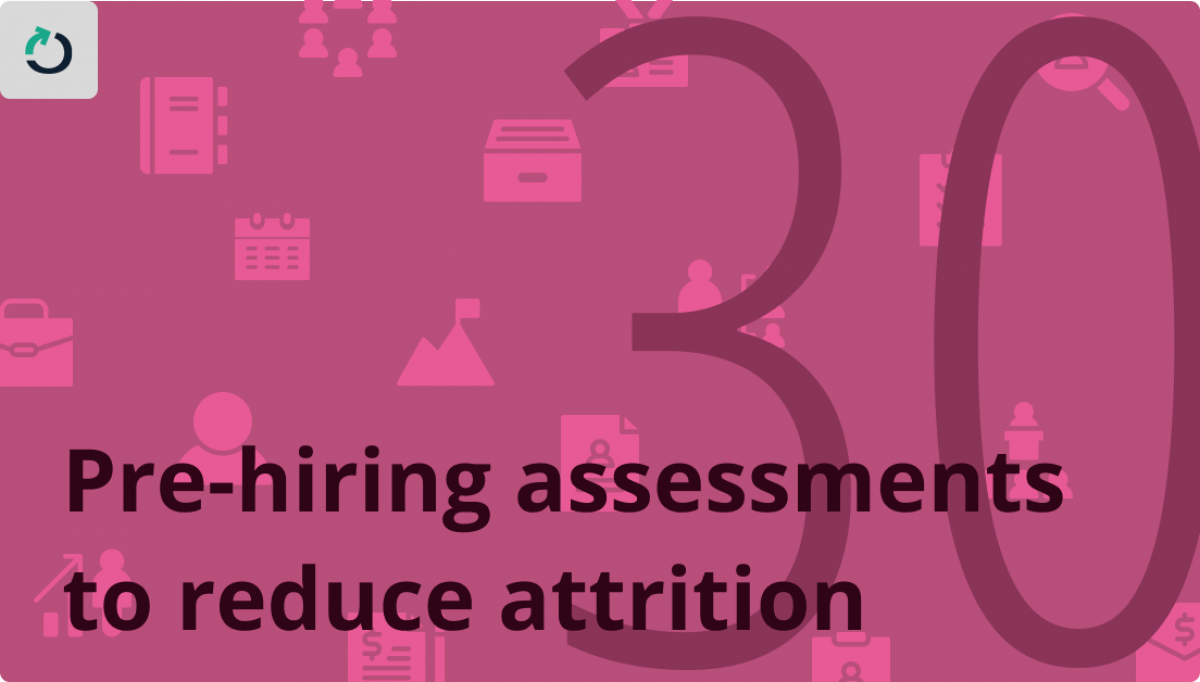Employee turnover can be a significant concern for any organization, as it can result in increased costs, decreased productivity, and loss of valuable knowledge and skills. It is estimated that the cost of replacing an employee can range from 30% to 150% of the employee's annual salary (SHRM, 2019). Therefore, it is critical for employers to implement effective strategies to reduce employee turnover.
One approach that has gained popularity in recent years is pre-hiring skill assessments. Pre-hiring skill assessments refer to a range of tests, tasks, or other assessment methods used to evaluate candidates' skills, knowledge, and abilities before making a hiring decision. The primary goal of pre-hiring skill assessments is to identify the best candidate for the job and reduce the risk of making a bad hire.
Research has shown that pre-hiring skill assessments can reduce employee turnover in several ways. First, pre-hiring skill assessments can help ensure that the candidate has the necessary skills and knowledge to perform the job. When a candidate is evaluated based on their abilities and not just their resume, there is a better chance of hiring someone who can perform the job duties effectively. This, in turn, can lead to increased job satisfaction and lower turnover rates.
A study conducted by the Aberdeen Group found that companies that use pre-hiring assessments had a 39% lower turnover rate compared to those that did not use assessments (Aberdeen Group, 2014). The study also found that companies that used pre-hiring assessments had a 20% increase in employee engagement and a 23% increase in revenue. This suggests that pre-hiring assessments can lead to better hiring decisions, resulting in more engaged and productive employees who are less likely to leave the company.
Second, pre-hiring skill assessments can help ensure that the candidate is a good fit for the company culture. Cultural fit is a critical factor in job satisfaction and employee retention. When employees feel that they fit in with the company culture, they are more likely to be engaged and committed to the organization. On the other hand, employees who do not fit in with the company culture are more likely to feel disconnected and disengaged, leading to higher turnover rates.
A study conducted by Glassdoor found that a strong company culture can reduce employee turnover by up to 50% (Glassdoor, 2019). Pre-hiring skill assessments can help identify candidates who share the company's values and beliefs, and who are likely to fit in with the company culture. This can lead to more satisfied and engaged employees who are less likely to leave the company.
Third, pre-hiring skill assessments can help reduce bias in the hiring process. Unconscious bias can influence hiring decisions, resulting in the selection of candidates who may not be the best fit for the job. Pre-hiring assessments can help reduce bias by providing objective data on the candidate's skills and abilities. This can lead to a more diverse and inclusive workforce, which has been shown to have numerous benefits, including increased innovation, better decision-making, and improved financial performance (McKinsey & Company, 2015).
A study conducted by Harvard Business Review found that companies with diverse workforces had a 19% increase in revenue compared to companies with less diverse workforces (Harvard Business Review, 2018). Pre-hiring assessments can help ensure that the best candidate is selected, regardless of their background or personal characteristics. This can lead to a more diverse and inclusive workforce, which can result in better performance and reduced turnover rates.
Finally, pre-hiring skill assessments can help reduce the time and cost of the hiring process. The hiring process can be time-consuming and expensive, particularly when a bad hire is made. Pre-hiring assessments can help reduce the risk of making a bad hire, saving time and money in the long run. One study conducted by SHL, a talent assessment company, found that employers who used pre-hiring skill assessments experienced a 39% decrease in the amount of time it took to fill a position. Additionally, the study found that companies who used pre-hiring assessments had a 49% reduction in hiring costs per employee (SHL, 2015). These results suggest that pre-hiring assessments can help reduce the time and cost of the hiring process, making it a more efficient and effective process.
In addition to these benefits, pre-hiring assessments can also help improve the quality of the hiring process. By using assessments to evaluate candidates, employers can gain a more comprehensive understanding of their skills, abilities, and fit for the job. This can lead to better hiring decisions and higher-quality candidates, resulting in improved performance and productivity.
There are several different types of pre-hiring assessments that employers can use, including cognitive ability tests, personality assessments, job knowledge tests, and situational judgment tests. Each type of assessment measures different aspects of the candidate's abilities and can be tailored to the specific requirements of the job.
For example, cognitive ability tests measure a candidate's problem-solving and analytical skills, while personality assessments measure their behavioral traits and preferences. Job knowledge tests evaluate a candidate's knowledge of specific job-related topics, and situational judgment tests measure their ability to make effective decisions in work-related scenarios.
Research has shown that using a combination of assessments can provide the most comprehensive and accurate evaluation of a candidate's abilities. A study conducted by the International Journal of Selection and Assessment found that using multiple assessments, including cognitive ability tests, personality assessments, and job knowledge tests, resulted in the highest levels of predictive validity (International Journal of Selection and Assessment, 2017). Predictive validity refers to the ability of the assessment to predict job performance accurately.
In conclusion, pre-hiring skill assessments can be an effective strategy for reducing employee turnover. By evaluating candidates based on their skills, abilities, and fit for the job and company culture, employers can make more informed hiring decisions and reduce the risk of making a bad hire. This can lead to more engaged, satisfied, and productive employees who are less likely to leave the company.
Research has shown that pre-hiring assessments can lead to reduced turnover rates, increased employee engagement, and improved financial performance. Additionally, pre-hiring assessments can help reduce bias in the hiring process, create a more diverse and inclusive workforce, and reduce the time and cost of the hiring process.
In pre-hiring assessment platform like Merreo, employers can choose from a range of assessment methods, including cognitive ability tests, personality assessments, job knowledge tests, and situational judgment tests. By using a combination of assessments, employers can gain a more comprehensive and accurate understanding of the candidate's abilities and make the best hiring decision for the organization. Overall, pre-hiring assessments are a valuable tool for reducing employee turnover and creating a more productive and engaged workforce.





